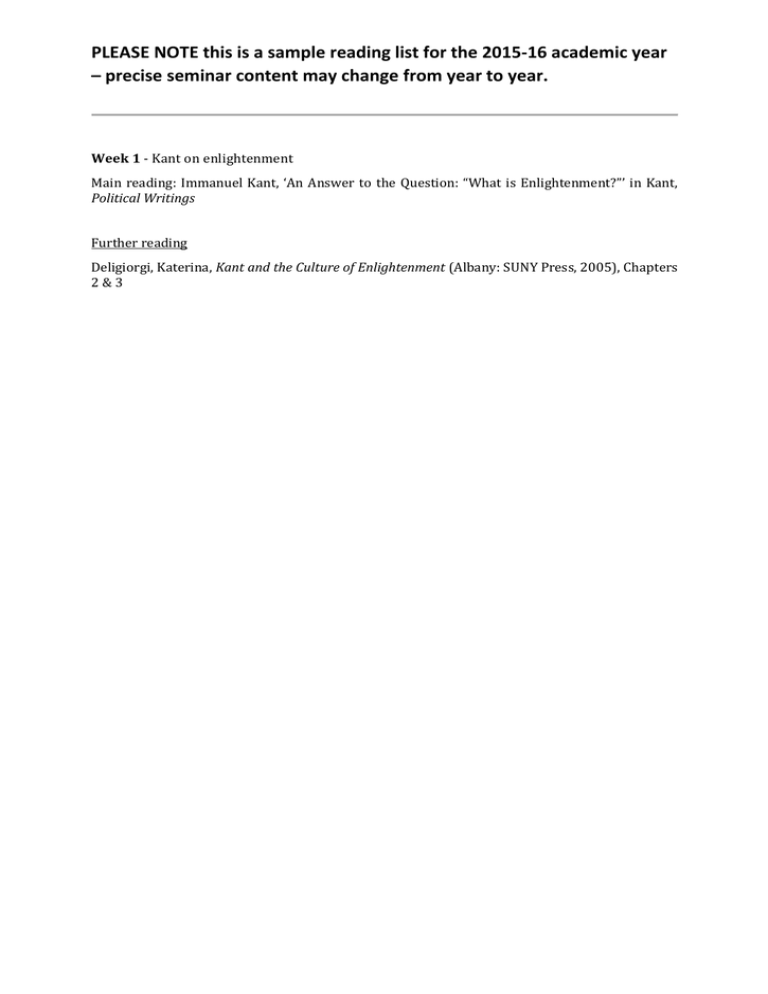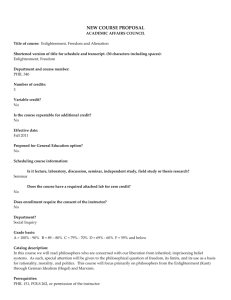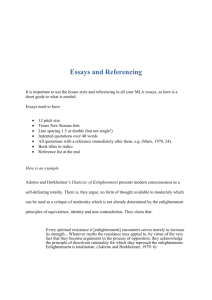PLEASE NOTE this is a sample reading list for the... – precise seminar content may change from year to year.
advertisement

PLEASE NOTE this is a sample reading list for the 2015-16 academic year – precise seminar content may change from year to year. Week 1 - Kant on enlightenment Main reading: Immanuel Kant, ‘An Answer to the Question: “What is Enlightenment?”’ in Kant, Political Writings Further reading Deligiorgi, Katerina, Kant and the Culture of Enlightenment (Albany: SUNY Press, 2005), Chapters 2&3 2 DiCenso, James J., Kant, Religion, and Politics (Cambridge University Press, 2011, Chapter 2 Fleischacker, Samuel, What is Enlightenment? (London: Routledge, 2013), Chapters 1 & 2 Laursen, John Christian, ‘The Subversive Kant: The Vocabulary of “Public” and “Publicity”’, in James Schmidt (ed.), What is Enlightenment: Eighteenth-Century Questions and Twentieth-Century Questions (Berkeley: University of California Press, 1996) Week 2 – Enlightenment and history Main reading: Immanuel Kant, ‘Idea for a Universal History with a Cosmopolitan Purpose’ and ‘The Contest of the Faculties: A Renewed Attempt to Answer the Question: “Is the Human Race Continually Improving?”’, in Kant, Political Writings Further reading James, David, Rousseau and German Idealism: Freedom, Dependence and Necessity (Cambridge: Cambridge University Press, 2013), Chapter 2. Rorty, Amélie Oksenberg and Schmidt, James (eds.), Kant’s Idea for a Universal History with a Cosmopolitan Aim (Cambridge: Cambridge University Press, 2009) Wood, Allen W., Kant’s Ethical Thought (Cambridge: Cambridge University Press, 1999), Chapters 7 and 9. Yovel, Yirmiahu, Kant and the Philosophy of History (Princeton: Princeton University Press, 1980) Week 3 - Enlightenment in Hegel’s Phenomenology of Spirit Main reading: G. W. F. Hegel, Phenomenology of Spirit, Preface: On Scientific Cognition, paragraphs 1-41 (pp. 1-24) and Introduction (pp. 46-57) Further reading Houlgate, Stephen, Hegel’s Phenomenology of Spirit: A Reader’s Guide (London: Bloomsbury, 2013), Chapters 1 and 2 Hyppolite, Jean, Genesis and Structure of Hegel’s Phenomenology of Spirit, trans. S. Cherniak and John Heckman (Evanston: Northwestern University Press, 1974), Part I, 1, 2 and 3 Siep, Ludwig, Hegel’s Phenomenology of Spirit, trans. D. Smyth (Cambridge University Press, 2014), Chapter 5 Stern, Robert, Hegel and the Phenomenology of Spirit (London: Routledge, 2002/2013), Chapter 1 Week 4 – Hegel on the Enlightenment Main reading: Hegel, Phenomenology of Spirit, BB. Spirit. B. Self-alienated Spirit. Culture (pp. 294296), II. The Enlightenment (pp. 328-355) Further reading Hinchman, Lewis P., Hegel’s Critique of the Enlightenment (Tampa: University of South Florida Press, 1984), Chapter 5, pp. 122-141 3 Hyppolite, Genesis and Structure of Hegel’s Phenomenology of Spirit, Part V, 4 James, David, ‘Enlightenment and the Unconditional Good: From Fichte to the Frankfurt School’, International Journal of Philosophical Studies http://www.tandfonline.com/doi/full/10.1080/09672559.2015.1107614 (forthcoming) Siep, Hegel’s Phenomenology of Spirit, Chapter 6, pp. 175-187 Stern, Hegel and the Phenomenology of Spirit, Chapter 5, pp. 173-179 (in latest edition) Stolzenberg, Jürgen, ‘Hegel’s Critique of the Enlightenment in the “The Struggle of the Enlightenment with Superstition”’, in K. R. Westphal (ed.), The Blackwell Guide to Hegel’s Phenomenology of Spirit (Malden, M.A.: Wiley-Blackwell, 2009) Week 5 – Hegel on the French Revolution Main reading: Hegel, Phenomenology of Spirit, BB. Spirit. B. Self-alienated Spirit. Culture III. Absolute Freedom and Terror (pp. 355-363) Further reading: Comay, Rebecca, Morning Sickness: Hegel and the French Revolution (Stanford: Stanford University Press, 2010) Hinchman, Lewis P., Hegel’s Critique of the Enlightenment (Tampa: University of South Florida Press, 1984), Chapter 5, pp. 141-154 Hyppolite, Jean, ‘The Significance of the French Revolution in Hegel’s Phenomenology’, in his Studies on Marx and Hegel, trans. J. O’Neill (London: Heinemann, 1969) Ritter, Joachim, Hegel and the French Revolution: Essays on the Philosophy of Right, trans. R. D. Winfield (Cambridge, MA: MIT Press, 1982) Schmidt, James, ‘Cabbage Heads and Gulps of Water: Hegel on the Terror’, Political Theory 26:4 (1998), pp. 4-32 Siep, Hegel’s Phenomenology of Spirit, Chapter 6, pp. 187-191 Stern, Hegel and the Phenomenology of Spirit, Chapter 5, pp. 179-191(in latest edition) Wokler, Robert, ‘Contextualizing Hegel’s Phenomenology of the French Revolution and the Terror’, Political Theory 26:1 (1998), pp. 33-55 Week 6 – Reading week Week 7 –Culture and the limits of Socratic rationalism: Nietzsche’s The Birth of Tragedy Main reading: Nietzsche, The Birth of Tragedy, Sections 1-5, 12-16, 18, 21, 23-25 Further reading Allison, David B., Reading the New Nietzsche (Lanham: Rowman & Littlefield, 2001), Chapter 1 Dannhauser, Werner J., Nietzsche’s View of Socrates (Ithaca: Cornell University Press, 1974), Chapter 2 Habermas, Jürgen, The Philosophical Discourse of Modernity, trans. Frederick Lawrence (Cambridge: Polity, 1987), Chapter 4 4 Silk, M. S and Stern, J. P., Nietzsche on Tragedy (Cambridge University Press, 1981) Young, Julian, Nietzsche’s Philosophy of Art (Cambridge University Press, 1992), Chapter 2 Week 8 – Horkheimer and Adorno: the concept of enlightenment Main reading: Horkheimer and Adorno, Dialectic of Enlightenment, Preface (1944 and 1947) and The Concept of Enlightenment, pp. x-xix and pp. 1-34 Week 9 – Horkheimer and Adorno: the story of Odysseus Main reading: Horkheimer and Adorno, Dialectic of Enlightenment, Excursus I: Odysseus or Myth and Enlightenment, pp. 35-62 Week 10 – Horkheimer and Adorno: the enlightenment and morality Main reading: Horkheimer and Adorno, Dialectic of Enlightenment, Excursus II: Juliette or Enlightenment and Morality, pp. 63-93 Further reading Bernstein, J. M., ‘Negative Dialectic as Fate: Adorno and Hegel’, in The Cambridge Companion to Adorno, ed. Tom Huhn (Cambridge University Press, 2004) -- Adorno: Disenchantment and Ethics (Cambridge University Press, 2001), Chapter 2 Brunkhorst, Hauke, ‘The Enlightenment and Rationality: Remarks on Horkheimer and Adorno’s Dialectic of Enlightenment’, Constellations 7(1) (2000) Habermas, The Philosophical Discourse of Modernity, Chapter 5 Horkheimer, Max, Critique of Instrumental Reason (London: Verso, 2012) -- ‘Reason Against Itself: Some Remarks on Enlightenment’, in James Schmidt (ed.), What is Enlightenment: Eighteenth-Century Questions and Twentieth-Century Questions (Berkeley: University of California Press, 1996) -- Eclipse of Reason (London: Continuum, 1996) Schmidt, James, ‘Language, Mythology, and Enlightenment: Historical Notes on Horkheimer and Adorno’s Dialectic of Enlightenment’, Social Research 65(4) (1998) Schuster, Martin, Autonomy after Auschwitz: Adorno, German idealism, and modernity (Chicago: The University of Chicago Press, 2014), Chapter 1 Sherratt, Yvonne, Adorno’s Positive Dialectic (Cambridge University Press, 2002), Prelude to Adorno’s Positive Dialectic I and II, Part I: Negative Thesis: The Decline of Enlightenment Zuidervaart, Lambert, Social Philosophy after Adorno (Cambridge University Press, 2007), Chapter 4




